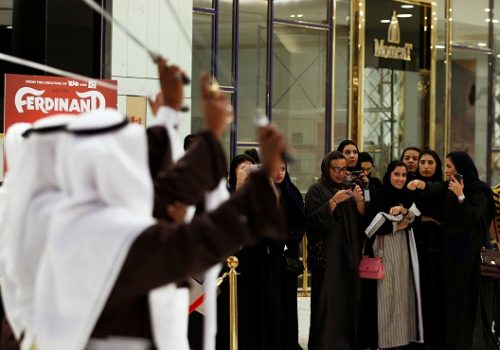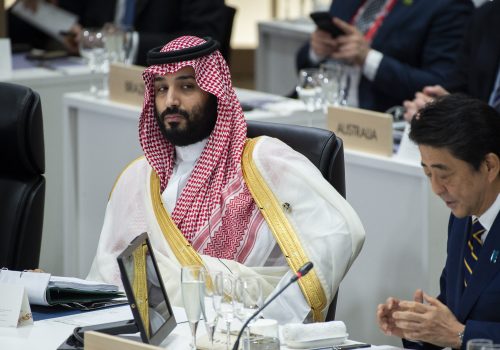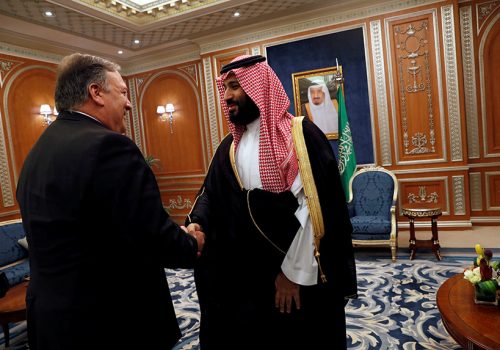After the Khashoggi report: How the US can respond and avoid blowback
The new US administration has been carefully timing three major movements on Saudi Arabia this week: the release of a declassified intelligence report on the 2018 murder of Washington Post columnist Jamal Khashoggi, the announcement of a US response, and the explanation of that response to Saudi King Salman bin Abdulaziz Al Saud. The timing of these actions matters, as the administration aims to show that it is holding the parties involved in the murder accountable while looking out for long-term US interests in a crisis-fraught region in which Saudi Arabia is a comparative island of stability. With the release of the report on Friday, the window for US policy responses is now open. The first response, in the form of a visa ban, has been announced. But further policy responses are expected.
The past few weeks have offered Joe Biden’s senior team their first opportunity to delve into the highly classified intelligence on the murder of the Saudi journalist; many of the people discussing how to formulate the US government’s response, in fact, may still not be privy to pieces of the compartmentalized intelligence, as access to it will be limited, as usual, to only a few members of government in order to protect the tactics, techniques, and procedures with which it was gathered. They will nevertheless be in a rush to respond because Congress will demand action from the administration as soon as Hill staffers and lawmakers have read the declassified details of what happened to Khashoggi. The president must also decide how to respond ahead of framing the realignment of the US bilateral relationship with Saudi Arabia.
Because the report confirms the US intelligence community’s assessment that Saudi Crown Prince Mohammed bin Salman (MBS) gave a direct order to kill Khashoggi, as the CIA’s late 2018 leaked report indicated, Biden will be under pressure from Congress, the media, members of his administration, human-rights groups, and many of his constituents to take punitive action against MBS. If any aspects of the US response are directed at the Crown Prince and his chances for ascending to the Saudi throne—after he has taken careful steps to ensure that outcome by consolidating oversight of Saudi Arabia’s security services and the financial payouts to the royal family under his direct control—the United States should expect retaliation. But by reaching out to King Salman to explain the logic behind changes to the bilateral relationship as soon as they are announced, Biden can reduce the likelihood that Riyadh retaliates against US interests.
What Saudi retaliation could look like
US actions that undermine the Crown Prince’s prospects for becoming king would likely elicit responses from Riyadh on multiple fronts. Saudi foreign direct investment in the US private sector could be curtailed; pending and future Saudi arms purchases from US companies could be redirected to Chinese, Russian, British, or French companies; and Saudi cooperation with China on the Kingdom’s civilian nuclear program and on a missile program, currently overseen by an entire branch of the Saudi armed services and aided by Chinese advisors in residence, could ramp up. The Saudi government could make decisions on oil production that would have a negative impact on Biden’s green-energy agenda or raise fuel prices to a level that sows displeasure among Biden’s political base.
Saudi Arabia might consider requests from other great powers or their allies to establish bases inside the Kingdom, and sending the tens of thousands of Saudi students who traditionally pay full tuition at small colleges across the United States to find other educational destinations. Saudi Arabia would likely politely decline any US requests for help in stabilizing Syria or coordinating actions in Iraq or Lebanon. In 2018, the Kingdom met a direct request from Brett McGurk, at the time the US counter-ISIS coordinator, for 100 million dollars in stabilization aid for Syria.
Saudi Arabia would almost certainly ignore US pressure related to the war in Yemen, pursuing its objective to remove the Houthis from Yemen’s capital and reinstate a government friendly to the Kingdom. The conflict would continue indefinitely and far more civilians would die. US ultimatums about ending the war in Yemen would be met with an “Or what?” from Riyadh.
Six options for US responses that can preserve US interests
There are several policy announcements the US administration could make to admonish the parties in Saudi Arabia responsible for Khashoggi’s death without making the United States the object of retribution.
First, Biden could choose through diplomatic means to put the Crown Prince in a box limited to his official roles. His counterparts in the US government would only communicate with him for purposes concerning his official titles—minister of defense, head of the country’s sovereign wealth fund, and chairman of the Council of Economic and Development Affairs—but would not treat him as a de facto head of state. This policy decision would be in line with the Biden administration’s statements to date and would not require policy changes or major interagency movements, though the impact would be significant as it would imply that the Crown Prince would not be safe from prosecution in American courts.
Second, Biden could stop sharing US intelligence with branches of the Saudi security services headed by individuals named in the Khashoggi report. This would preserve intelligence-sharing arrangements with key interlocutor services uninvolved in the murder. The sharing of US intelligence is highly valued in the Kingdom. A service without a sharing arrangement would be automatically downgraded in terms of its importance and operational capacity.
Third, Biden could withdraw US troops from Saudi Arabia. Planning for a withdrawal is already underway. At the moment, US Central Command advises against this policy decision if the new administration is serious about recent statements it has made regarding helping to secure the Kingdom against Iran-backed attacks executed through groups like the Houthis and new front groups like the True Promise Brigades. But given that the Khashoggi report implicates the Crown Prince, who is the Kingdom’s defense minister, Biden could choose to go ahead with the drawdown as a means of punishing Saudi Arabia. Such a decision risks emboldening Iran to take more indirect kinetic action and feeding perceptions in the region that the United States should not be the partner of choice among the world’s great powers. Yet it would be a way to exact a cost from Saudi Arabia without creating new policy and simply pressing forward with plans that are already in process.
Fourth, the Biden administration could place new demands on the Kingdom, and specifically on the Crown Prince’s ministry, related to military transformation. The United States is eager to see earnest action by the Kingdom to improve its own defense capacity and lower the burden on the United States of securing the Gulf. Based on a three-hundred-plus-point plan for reforms and improvements to this end that has been approved by Saudi military leadership up to MBS, this action is beginning. A plan already exists to greatly increase the level of US advisement inside the Saudi Ministry of Defense as part of a long-term military transformation program. Biden could characterize this act of embedding advisors as a requirement and explain that it stems from a need to have US eyes on decisions made by MBS. Biden can justify limiting this “requirement” to the Ministry of Defense based on his administration’s recent statement that the Crown Prince’s counterpart in the US government is Secretary of Defense Lloyd Austin.
Fifth, Biden could halt the sale of defensive military platforms to the Kingdom. The US administration has already halted the sale of offensive munitions like Paveways and small diameter bombs to Saudi Arabia in order to urge an end to the war in Yemen. But it has not yet canceled arms sales that provide the Saudis with defensive capability, in part because of the steady stream of rockets, missiles, and drones launched at Saudi Arabia by Iran-supported armed groups. These defensive-platform sales could be used as leverage to elicit other actions by Saudi Arabia like the release of political prisoners, political or legal reforms, or financial support for US stabilization plans in the region. As long as Russia is making S-400s, however, this is a risky proposition.
Sixth, Biden could sanction businesses owned by MBS or others named in the US intelligence report. The Crown Prince signed hundreds of billions of dollars in deals with the private sector during his whirlwind tour across the United States in the spring of 2018. Sanctioning Saudi enterprises involved in these deals might not enrage Saudi Arabia, because many of these contracts have not been completed and the Crown Prince likely has no intention of following through on them. Sanctioning these businesses, however, risks disappointing US companies still hoping for these contracts to come through. The administration would likely want to consider the volume and size of US companies impacted, as well as the political leanings of their owners, to assess the possible domestic political impact of such sanctions.
Apart from actions pertaining to the bilateral relationship, the United States could aim for change in the Saudi decision-making structure and inner circle. The Biden administration could, for example, demand the release from house arrest of Mohammed bin Nayef, the former crown prince and, just as notably, former primary partner for the CIA on counterterrorism. The US intelligence community would gladly build the case for his release if the administration requests that it do so.
Individuals and organizations named in the CIA’s 2018 unclassified report as parties to the Khashoggi murder were sanctioned immediately. One of these individuals was Saud al-Qahtani, the Crown Prince’s Rasputin. In response to US pressure, al-Qahtani was removed from his place at the elbow of the Crown Prince. He has since resurfaced and continues to be a key player in the technologies and programs that make the Crown Prince feel personally secure. The survivors and victims of al-Qahtani’s alleged abuses may bring suit against him in US courts, and criminal prosecutions can also be pursued in national systems if jurisdiction and other requirements are met. The US administration can encourage these victims to come forward.
Many of those in the US government and among the American public who are appalled at the actions of Saudi state institutions and individuals want Biden to respond with a heavy hand to the information released in the intelligence report on the Khashoggi murder. Some in the Democratic Party, who would like to see the US-Saudi relationship downgraded from the special status it received under former President Donald Trump, expect Biden to give Saudi Arabia a cold shoulder. The president’s foreign-policy team, meanwhile, is stacked with experienced Middle East experts who have plans for the region that include Saudi Arabia as a critical partner.
There is a wide array of options available to the United States as a response to the Khashoggi report. But some carry more potential for blowback than others. When assessing the range of options, the Biden administration should choose those that mitigate the negative impact on long-term US interests.
Kirsten Fontenrose is the director of the Scowcroft Middle East Security Initiative at the Atlantic Council.
Further reading
Image: Saudi Crown Prince Mohammed bin Salman speaks during the Future Investment Initiative Forum in Riyadh, Saudi Arabia October 24, 2018. Bandar Algaloud/Courtesy of Saudi Royal Court/Handout via REUTERS


